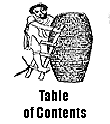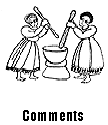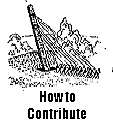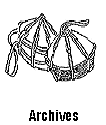

The Good Old Days of Leqsoby: Iyasou " I saw the video," said the woman angrily. " You hardly shed any tears."
"The camera dried my tears," replied the man calmly." When it moved away, I wailed like everybody else."
"It was not filmed, "said the woman definitively.
Case closed. Face lost.
Filming funerals has ruined many relationships. A classic example of our "traz neTeq" modernity, this new practice of registering the whole leqso procession and process on videotape has complicated matters. After the funeral, and the end of the leqso period, families gather to scrutinize the film with care. Who cried his or her heart out? Who was feigning? Who was just there for the food and drink? The film is copied and sent to relatives in the Diaspora, the "tzibt" crosses oceans and seas to stay alive. The "qim" is nurtured, the "beqel" will soon follow, God willing or insh'Allah.
The similarity between our modern weddings and leqso is growing to an extent that the difference between joy and sadness is fast receding. On both occasions, the assembled drink and have fun, and the whole process is filmed assiduously. In the past, those with drought stricken tear ducts were prompted by the alqash, professional women with trite two liners who never fail to make the leqso derasoch wail, tear out their hair (or pretend to), and beat their bare chests till, sometimes, it got chafed and bloody. Nowadays, the video has replaced the alqash. When the camera points at you, the tears better flow or your future relationship with the kin of the departed will forever be compromised.
The solemnity of leqso has long ago departed with the souls of the dead. Priests will not perform a fithat unless they are paid well and in advance-- so much so that the cost of a funeral is nowadays handled by the idir. After the qebr, more people flock to the leqso bEt to pay their "condolences", thereby justifying partaking in the quasi digis that continues for at least three days. At a leqso, beer bottles are emptied in earnest and men and women strike relationships… some leading to serg.
There is in one part of Gonder where people celebrate what they call "ibid ihud". On this day, multiple weddings are held, and costs are distributed evenly between the serg bEtoch. It makes economic sense. On ibid ihud the whole locality is racked by celebratory gunfire. As is, by the way, on a leqso. Merdo, as well as qebr itself is accompanied by intense rifle fire. No economy on bullets. "Semai kaltarese minun tedegese ". As well, "semai kaltarese minun teleqese".
Both at weddings and the leqsos, the wetT is prepared hotter, the Tella more potent to craftily discourage over consumption. You get drunk fast and the berberE is so hot that you won't be asking for more.
Of weddings and leqso. Of birth and death. Of joy and sorrow. Of past and present. In the nature of things seemingly diametrically opposed, there emerges much similarity. Do you laugh the same way you weep? Don’t lie… you can’t lie because the video camera is whirring. All is registered. When you yawn while others wail, —it’s all on film.
But times have changed, and we cannot laugh or weep like we used to… like the good old days… the good old days of a proper leqso.
|

|

|

|

|

|
| © Copyright SELEDA Ethiopia, February 2003. All Rights Reserved. |